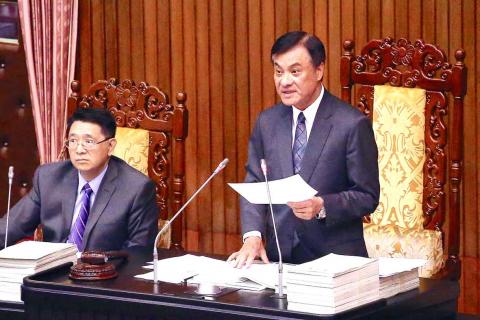The Legislative Yuan yesterday issued a joint statement on the South China Sea ruling, rejecting “any arbitrary decision made by international arbitration” concerning the Republic of China’s (ROC) rights over “the South China Sea islands and their relevant waters.”
Amid inter-party struggles in the legislature over the bill dealing with ill-gotten party assets, the four party caucuses reached consensus over the nation’s stance toward the ruling on Tuesday by the International Court of Arbitration in The Hague.
A statement announced by Legislative Speaker Su Jia-chyuan (蘇嘉全) at 5pm yesterday said that the arbitration ruling has “seriously damaged the rights of the nation to its territory and the regional peace of the South China Sea.”

Photo: CNA
“The legislature, the ROC’s highest representative institution and authorized by the nation’s citizens, has made a resolution to make an international statement on the basis of facts and jurisprudence,” it said.
“The ROC enjoys the rights conferred by international law over its South China Sea islands and its relevant waters as they are, in terms of history, geography and international law, part of the ROC’s territory and waters. Any country’s claims or occupation or any international arbitration’s arbitrary decision will not be recognized by the ROC,” the statement said.
“The ROC has been substantively occupying and effectively governing Taiping Island [太平島, Itu Aba Island] of the South China Sea islands for more than half a century without interruption. Former presidents Chen Shui-bian (陳水扁) and Ma Ying-jeou (馬英九) both visited the island, which has infrastructure for daily living and administration and military construction, in 2008 and this year respectively and confirmed the nation’s occupation and sovereignty, which is not to be challenged by any country or arbitration,” it said.
The third point of the statement said that the ROC government has undertaken and will continue to undertake “both outward-facing and inward-facing sovereignty protecting actions regarding the South China Sea islands including Taiping.”
The “outward-facing” part will be continuing its campaign to show the international community and related organizations evidence affirming the nation’s rights and claims over the islands and their relevant waters; the “inward-facing” action will be continuing the building on Itu Aba, including bolstering the forces and military equipment stationed there, promoting academic research and tourism, and reinforcing the basic infrastructures for transportation, communications and environmental protection.
“Taiping Island is a natural island, not a rock. The arbitration tribunal’s judgement is obviously at odds with facts. And that the award refers to the nation as ‘Taiwan Authority of China’ has belittled the nation’s status as a sovereign nation and is unacceptable to the ROC government and its people,” the statement said.
The resolution to make the statement, the cross-caucus negotiation for which was initiated by the People First Party (PFP) caucus, was endorsed by all caucuses, the Democratic Progressive Party, the Chinese Nationalist Party (KMT), the New Power Party and the PFP.
There was no mention of the “U-shaped line” or the “11-dash line” claims in the statement.

SECURITY: As China is ‘reshaping’ Hong Kong’s population, Taiwan must raise the eligibility threshold for applications from Hong Kongers, Chiu Chui-cheng said When Hong Kong and Macau citizens apply for residency in Taiwan, it would be under a new category that includes a “national security observation period,” Mainland Affairs Council (MAC) Minister Chiu Chui-cheng (邱垂正) said yesterday. President William Lai (賴清德) on March 13 announced 17 strategies to counter China’s aggression toward Taiwan, including incorporating national security considerations into the review process for residency applications from Hong Kong and Macau citizens. The situation in Hong Kong is constantly changing, Chiu said to media yesterday on the sidelines of the Taipei Technology Run hosted by the Taipei Neihu Technology Park Development Association. With

A US Marine Corps regiment equipped with Naval Strike Missiles (NSM) is set to participate in the upcoming Balikatan 25 exercise in the Luzon Strait, marking the system’s first-ever deployment in the Philippines. US and Philippine officials have separately confirmed that the Navy Marine Expeditionary Ship Interdiction System (NMESIS) — the mobile launch platform for the Naval Strike Missile — would take part in the joint exercise. The missiles are being deployed to “a strategic first island chain chokepoint” in the waters between Taiwan proper and the Philippines, US-based Naval News reported. “The Luzon Strait and Bashi Channel represent a critical access

‘FORM OF PROTEST’: The German Institute Taipei said it was ‘shocked’ to see Nazi symbolism used in connection with political aims as it condemned the incident Sung Chien-liang (宋建樑), who led efforts to recall Democratic Progressive Party (DPP) Legislator Lee Kun-cheng (李坤城), was released on bail of NT$80,000 yesterday amid an outcry over a Nazi armband he wore to questioning the night before. Sung arrived at the New Taipei City District Prosecutors’ Office for questioning in a recall petition forgery case on Tuesday night wearing a red armband bearing a swastika, carrying a copy of Adolf Hitler’s Mein Kampf and giving a Nazi salute. Sung left the building at 1:15am without the armband and apparently covering the book with a coat. This is a serious international scandal and Chinese

COUNTERINTELLIGENCE TRAINING: The ministry said 87.5 percent of the apprehended Chinese agents were reported by service members they tried to lure into becoming spies Taiwanese organized crime, illegal money lenders, temples and civic groups are complicit in Beijing’s infiltration of the armed forces, the Ministry of National Defense (MND) said in a report yesterday. Retired service members who had been turned to Beijing’s cause mainly relied on those channels to infiltrate the Taiwanese military, according to the report to be submitted to lawmakers ahead of tomorrow’s hearing on Chinese espionage in the military. Chinese intelligence typically used blackmail, Internet-based communications, bribery or debts to loan sharks to leverage active service personnel to do its bidding, it said. China’s main goals are to collect intelligence, and develop a